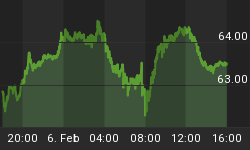It's almost unanimous that the dollar is over-valued. The strength of the conviction is matched by the weakness of the argument.
The argument is based on the current account deficit, which in 2002 was 4.5% of GDP. Already, foreigners own more US assets than vice versa. The gap is around 20% of GDP. If the current account deficit doesn't fall, it is claimed that this will rise forever and it obviously can't.
This is probably true, but it disguises much more than it tells. The US stock of capital is about three times the size of its GDP, so foreigners' capital surplus is only equal to 7% of that stock.
The capital stock is also growing in line with GDP, which rises at around 3.5% p.a., or much more if you share the hopes of Alan "Bubbles" Greenspan in a US productivity miracle. Even on the more cautious assumption, this means that foreigners will only own 12% of the US capital stock in 2010.
In a world of massive disequilibria, the threat that foreigners will, on current trends, own 12% of the US capital stock by the next decade is hardly worth half a pint in a gloom merchants' saloon bar.
If the dollar is over-valued, sterling must be in cloud cuckoo land. In 1985, the sterling dollar exchange rate was almost one to one. Since then sterling has risen by nearly 60% in nominal terms and 70% in real ones, as US inflation has been slower than ours. Unless the dollar managed to be 70% over-valued in 1985, sterling is likely to be even more over-priced than the dollar today.
If the dollar now falls against the Euro, and sterling then behaves in its usual mid-Atlantic manner, it will rise against the dollar and become, therefore, even more over-valued.
The key assumption of the dollar bears is that current account balances are a guide to currency values. One key reason why they are not is demography.
When populations age, the birth rate falls. Unless there is a lot of immigration, the workforce then starts to decline and with it the growth rate of the economy. This reduces the amount of investment that can earn a decent return.
In time, this fall in investment will be matched by a fall in savings, as the proportion of those retired rises. But people save most in the years before retirement. So the savings rate only starts to fall many years after the workforce starts to shrink.
During this gap, the countries with least immigration and lowest birth rates will need to export a lot of capital. If they don't they will have a huge dependency problem once the numbers of people employed starts to fall relative to the numbers retired. Japan and to a lesser extent Europe are the economies which need to export a lot of capital.
The Japanese workforce is contracting and Europe is not far behind. But with a higher birth rate and higher immigration, the US workforce is expanding. Until countries with ageing populations start to live off their savings, the natural result is that the US needs to run a large current account deficit.
The demographic problem is well known and the problem is frequently aired in the press. But it's incompatible with the idea that current account balances are a guide to currency values.
It is not as if demography was the only issue. Current account balances naturally swing around their equilibrium levels with swings in the economic cycle. The US economy is far from firing on all cylinders, but it is firing on more than either Japan or Europe.
If allowance is made for the differences in demography and the economic cycles, it is far from clear that the dollar is mis-valued even against the Euro. When it comes to over-valued currencies, the yen and sterling look much better bets.















